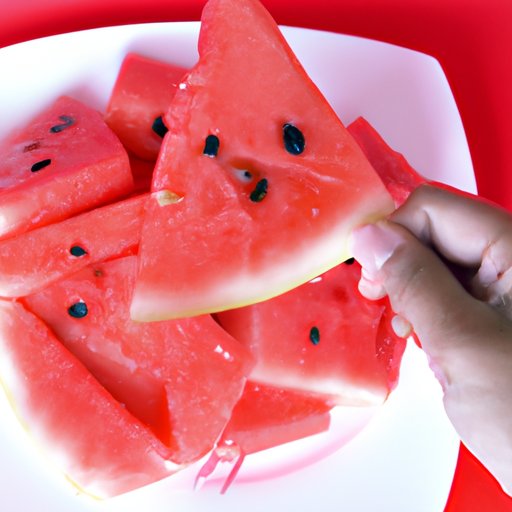Introduction
With summer coming around, we’re all looking for new ways to stay cool and healthy during the hottest months of the year. Many people are asking if watermelon is good for them and what kind of benefits it can provide. This article will explore the nutritional, health and scientific benefits of eating watermelon and give you tips on how to add it to your diet.
Nutritional Benefits of Eating Watermelon
Watermelon is an excellent source of vitamins and minerals like vitamin C, vitamin A, potassium, magnesium, and lycopene. It is also low in calories, with only 46 calories per cup. In addition, watermelon contains powerful antioxidants like carotenoids and flavonoids which help protect cells from damage.
Health Benefits of Watermelon for Weight Loss
Watermelon is a great fruit to add to your diet if you’re trying to lose weight. Its high water content helps keep you full while its low-calorie but high in fiber content can help reduce fat storage. Plus, it’s a great way to satisfy your sweet tooth without adding too many calories to your daily intake.

The Science Behind Why Watermelon is Good for You
Research has shown that watermelon can improve cardiovascular health by reducing inflammation and lowering blood pressure. It also has been found to aid in digestion and boost your immune system due to its high levels of vitamin C. Additionally, watermelon’s high lycopene content can help protect against certain cancers.

How to Add Watermelon to Your Diet
Adding watermelon to your diet is easy! Start by adding it to your meals like salads and smoothies, or try using it as a creative snack idea like popsicles. You can also incorporate it into your lifestyle with tips like drinking watermelon juice before workouts and adding it to your breakfast bowl.
Recipes for Healthy Watermelon Dishes
There are plenty of ways to add watermelon to your diet that are both healthy and delicious. Here are some recipes to get you started:
- Salads: Try making a classic watermelon feta salad or a watermelon and cucumber salad.
- Smoothies: Blend watermelon with other fruits like strawberries, apples, and bananas for a refreshing smoothie.
- Popsicles: Freeze watermelon and blend it with yogurt and honey for a healthy and tasty popsicle.

Potential Risks and Side Effects of Eating Too Much Watermelon
While there are many benefits to eating watermelon, it is important to remember to consume it in moderation. Eating too much watermelon can lead to an increase in sugar intake, digestive issues, and allergic reactions.
Conclusion
In conclusion, watermelon is a delicious and nutritious fruit that has many benefits. It is high in vitamins and minerals, low in calories, and full of antioxidants. It can also help with weight loss, improve cardiovascular health, aid in digestion, and boost your immune system. However, it is important to remember to consume it in moderation, as eating too much can lead to an increase in sugar intake, digestive issues, and allergic reactions.
By following the tips and recipes provided, you can easily incorporate watermelon into your diet and start reaping the benefits.
(Note: Is this article not meeting your expectations? Do you have knowledge or insights to share? Unlock new opportunities and expand your reach by joining our authors team. Click Registration to join us and share your expertise with our readers.)
